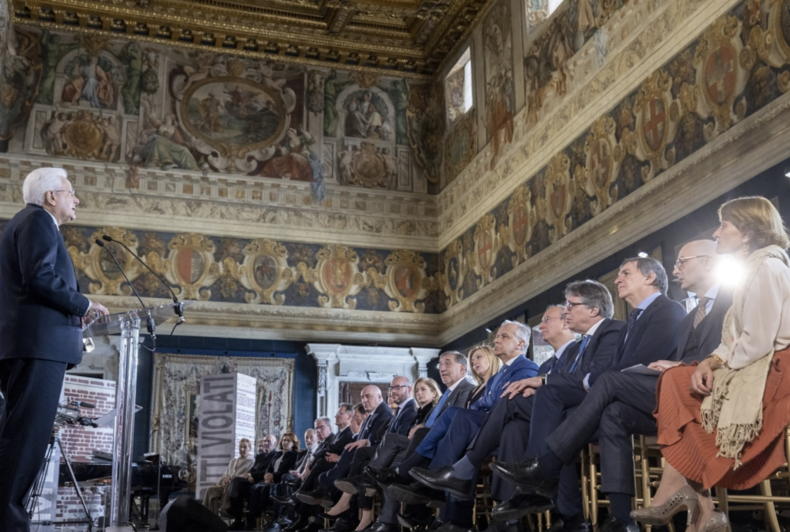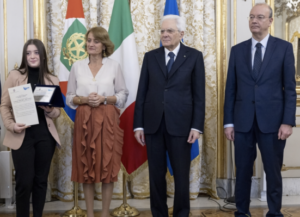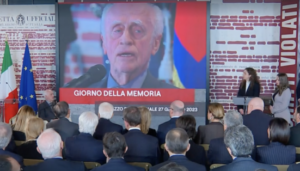Mattarella: “Italian responsibilities, more awareness is needed”

“Never again to a world dominated by violence, abuses, racism, cult of personality, aggressions and war. Never again to a government that crushes freedom and rights. Never again to a society that discriminates, divides, isolates, and persecutes. Never again to a culture or an ideology that sings the praises of racial superiority, intolerance, fanaticism”.
From the Quirinal palace, Head of State Sergio Mattarella expressed these clear and firm words on the duty of remembrance. A future-oriented action that arises from a conscious confrontation with the past, its mistakes, and horrors. As he underlined at the solemn ceremony for 27th January held at the presidential palace this year, Auschwitz, and all its associated camps, was as a matter of fact “the extreme but unavoidable consequence of anti-historical and anti-scientific drives, brutal instincts, prejudices, harmful beliefs and mean interests, and even fashion conformism”.
 It was the peak of a process triggered in Italy by the Racial Laws of 1938, the infamous deed of a regime that “cruelly acted against a part of our people”. “From one day to the next, Italians of Jewish origin were denied citizenship, meaning membership of the state”, recalled Mattarella. “Among these innocents, – he added – were numerous volunteers and decorated soldiers who fought in the First World War, protagonists of Italy’s social, cultural and economic life. They were expelled from the army, the public administration, schools and universities. They were banned from working as self-employed professionals. Their books, their works of art, were banned and burned. Their goods confiscated. Their census as Jews favoured their later concentration in ghettos or detention camps and enabled the Nazi executioners to carry out the infamous work of deportation, in cattle trains, towards the factories of death”.
It was the peak of a process triggered in Italy by the Racial Laws of 1938, the infamous deed of a regime that “cruelly acted against a part of our people”. “From one day to the next, Italians of Jewish origin were denied citizenship, meaning membership of the state”, recalled Mattarella. “Among these innocents, – he added – were numerous volunteers and decorated soldiers who fought in the First World War, protagonists of Italy’s social, cultural and economic life. They were expelled from the army, the public administration, schools and universities. They were banned from working as self-employed professionals. Their books, their works of art, were banned and burned. Their goods confiscated. Their census as Jews favoured their later concentration in ghettos or detention camps and enabled the Nazi executioners to carry out the infamous work of deportation, in cattle trains, towards the factories of death”.
In northern and central Italy, he continued, “after the dramatic events following 8 September 1943, the fascist militia participated in the hunt and capture of Jews, who were handed over to the German SS”. A mechanism of destruction that “would not have happened if there had not been a consensus, sometimes tacit but nevertheless widespread, in the population”. A consensus with different degrees and motivations: “unconditional adherence, fear, but also, and often, conformism and that horrible moral apathy constituted by indifference”.
Few and isolated, he stressed, “were the enlightened figures in Germany and Italy who raised their voices to condemn racism and its deadly drift”. In this democratic Italy, “the principles of our Republican Constitution and the Charter of Universal Human Rights” as a “radical denial of the universe that led to Auschwitz” must be protected so that this never happens again.
Previous speakers had been UCEI President Noemi Di Segni and Education Minister Giuseppe Valditara, as well as CDEC Foundation President Giorgio Sacerdoti, with an introductory speech entitled “From violated rights to protected rights”, and Ugo Foà, who is now 95 years old and was expelled from school when he was a child. There were also the Country’s highest institutional figures – Prime Minister Giorgia Meloni, President of the Senate Ignazio La Russa, President of the Chamber of Deputies Lorenzo Fontana – as well as Holocaust survivors Edith Bruck and Sami Modiano.
 “To remember means to be able to open our vocabulary, to understand the meaning that certain words have for us, to be able to add those that are still missing – responsibility and coherence – to be able to put the full explanation next to certain terms. By doing so, today’s students will know what Italy was like in the years ’38-’45, and they will be able to understand the Holocaust in its full Italian meaning”, one of the messages shared by Di Segni in her speech. “Not only the students, but also every one of us, has to know what Italy was in the decades of Fascism, its legacies hidden in the post-war period and nostalgically re-evoked today”. Cultivate Memory, continued the UCEI president, does not mean listening “to the Jews with a merciful touch for the extermination of six million of them”, but it means awareness “of Italian responsibility, understanding that indifference was the word that made the difference”.
“To remember means to be able to open our vocabulary, to understand the meaning that certain words have for us, to be able to add those that are still missing – responsibility and coherence – to be able to put the full explanation next to certain terms. By doing so, today’s students will know what Italy was like in the years ’38-’45, and they will be able to understand the Holocaust in its full Italian meaning”, one of the messages shared by Di Segni in her speech. “Not only the students, but also every one of us, has to know what Italy was in the decades of Fascism, its legacies hidden in the post-war period and nostalgically re-evoked today”. Cultivate Memory, continued the UCEI president, does not mean listening “to the Jews with a merciful touch for the extermination of six million of them”, but it means awareness “of Italian responsibility, understanding that indifference was the word that made the difference”.
Valditara then commemorated all those citizens “of Jewish religion who were exterminated due to the collaborationism of the fascist regime, which allowed and even favoured their deportation: we cannot forget that Decree-Law No. 1728 of 17th November 1938, containing ‘Measures for the Defence of the Race’, forbade some fundamental rights to Jewish citizens”and that Article 1, clause 3 of the Civil Code of 1942 later “limited legal capacity to the so-called non-Aryans and especially to the Jews”. “‘Remembering – his warning – is even more important today when antisemitism is on the rise again in Europe”.
The ceremony – conducted by actor Andrea Pennacchi, who read excerpts from Primo Levi, Vassily Grossman and Yankel Yakov Wiernik – also featured Maestro Francesco Lotoro, violinist Fabrizio Signorile, soprano Anna Maria Stella Pansini and rapper Davide Milano among the artists who took part.
Also the students who took part in the annual “Young People Remember the Holocaust’ competition” were involved, whose winning schools were then awarded prizes by the institutions.
From the top, the speech of Head of State Sergio Mattarella; the award ceremony of the “Young People Remember the Holocaust’ competition”; the interview with Ugo Foà, expelled from school by the racist laws at the age of 10.
Translation by Alice Pugliese, revised by Martina Bandini, students at the Secondary School of Modern Languages for Interpreters and Translators of the University of Trieste, interns at the newspaper office of the Union of the Italian Jewish Communities – Pagine Ebraiche.
